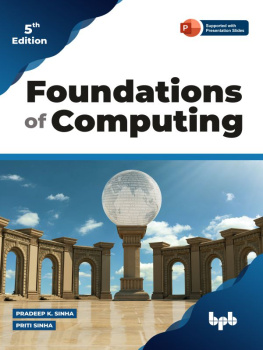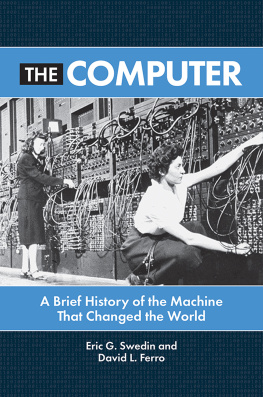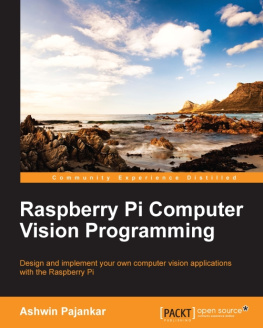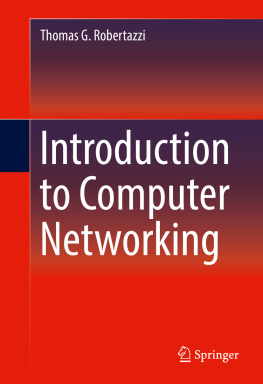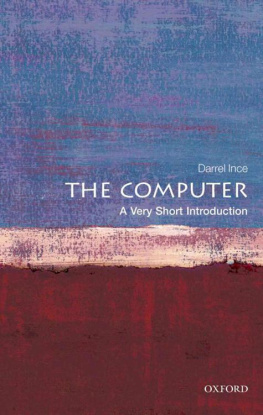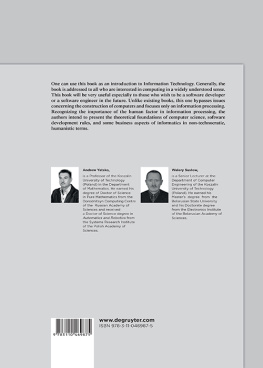COMPUTER

THE SLOAN TECHNOLOGY SERIES

COMPUTER
A History of the Information Machine
THIRD EDITION
Martin Campbell-Kelly
William Aspray
Nathan Ensmenger
Jeffrey R.Yost

A Member of the Perseus Books Group
WESTVIEW PRESS was founded in 1975 in Boulder, Colorado, by notable publisher and intellectual Fred Praeger. Westview Press continues to publish scholarly titles and high-quality undergraduate- and graduate-level textbooks in core social science disciplines. With books developed, written, and edited with the needs of serious nonfiction readers, professors, and students in mind, Westview Press honors its long history of publishing books that matter.
Copyright 2014 by Martin Campbell-Kelly and William Aspray
Published by Westview Press,
A Member of the Perseus Books Group
All rights reserved. No part of this book may be reproduced in any manner whatsoever without written permission except in the case of brief quotations embodied in critical articles and reviews. For information, address Westview Press, 2465 Central Avenue, Boulder, CO 80301.
Find us on the World Wide Web at www.westviewpress.com.
Every effort has been made to secure required permissions for all text, images, maps, and other art reprinted in this volume.
Westview Press books are available at special discounts for bulk purchases in the United States by corporations, institutions, and other organizations. For more information, please contact the Special Markets Department at the Perseus Books Group, 2300 Chestnut Street, Suite 200, Philadelphia, PA 19103, or call (800) 810-4145, ext. 5000, or e-mail .
Library of Congress Cataloging-in-Publication Data
Campbell-Kelly, Martin.
Computer : a history of the information machine / Martin Campbell-Kelly, William Aspray, Nathan Ensmenger, and Jeffrey R. Yost. Third edition.
pages cm
Includes bibliographical references and index.
ISBN 978-0-8133-4591-8 (ebook)
1. ComputersHistory. 2. Electronic data processingHistory. I. Aspray, William. II. Ensmenger, Nathan, 1972 III. Yost, Jeffrey R. IV. Aspray, William. V. Title.
QA76.17.C36 2013
004dc23
2013008040
10 9 8 7 6 5 4 3 2 1
CONTENTS
THIS BOOK has its origins in the vision of the Alfred P. Sloan Foundation that it is important for the public to understand the technology that has so profoundly reshaped Western society during the past century. In the fall of 1991 Arthur Singer of the Sloan Foundation invited us (Aspray and Campbell-Kelly) to write a popular history of the computer. It was a daunting, yet irresistible, opportunity. Without the invitation, encouragement, generous financial support, and respectful treatment we received from the Sloan Foundation, this book would never have been written.
It is a pleasure to thank many academic colleagues who, over three editions of Computer, have given us advice or checked sections of our manuscript; among them: Jon Agar, Kenneth Beauchamp, Jonathan Bowen, I. Bernard Cohen, John Fauvel, Jack Howlett, Thomas Misa, Arthur Norberg, Judy ONeill, Emerson Pugh, and Steve Russ. Our thanks go to numerous archivists who helped us to locate suitable illustrations and other historical materials; among them: Bruce Bruemmer and Kevin Corbett (formerly at the Charles Babbage Institute), Arvid Nelsen (Charles Babbage Institute), Debbie Douglas (MIT Museum), Paul Lasewicz (IBM Corporate Archives), Henry Lowood (Stanford University), Erik Rau (Hagley Library), Dag Spicer (Computer History Museum), and Erica Mosner (Institute for Advanced Study, Princeton). For the first edition of this book Susan Rabiner of Basic Books took us by the hand and coached us on how to write for a general readership. Our successive editors at Westview Press have been a source of wisdom and encouragement: Holly Hodder, Lisa Teman, Priscilla McGeehon, Carolyn Sobczak, and Christine Arden. Notwithstanding these many contributions, we take full responsibility for the contents.
Martin Campbell-Kelly
William Aspray
Nathan Ensmenger
Jeffrey R. Yost
SINCE THE appearance of the second edition in 2004, computing has continued to evolve rapidly. Most obviously, the Internet has grown to maturity such that it is now an integral part of most peoples lives in the developed world. Although computing was widely diffused by the end of the twentieth century, it has become truly ubiquitous only in the present centurya transition brought about by Internet commerce, consumer computing in the form of smartphones and tablet computers, and social networking.
The study of the history of computing has also matured as an academic enterprise. When the first edition of this book appeared in 1996, the history of computing had only recently begun to attract the attention of the academy, and research on this topic tended to be quite technically oriented. Since that time many new scholars with different perspectives have joined the field, and it is rare to find a science, technology, or business history conference that does not discuss developments in, and impacts of, computing technology. In short, the user experience and business applications of computing have become central to much of the historical discourse. To harness these new perspectives in our narrative we have been joined by two additional authors, Nathan Ensmenger and Jeffrey Yostboth scholars from the rising generation.
As always in a new edition, we have sparingly revised the text to reflect changing perspectives and updated the bibliography to incorporate the growing literature of the history of computing. We have also introduced some substantial new material. In have made substantial additions to exploit the growing literature on the software professions, the semiconductor industry, pre-Internet networking, and the manufacture of computers.
Unsurprisingly, , on the development of the Internet, is the most changed. The chapter has been extended and divided into two parts: the creation of the Internet, and the World Wide Web and its consequences. The latter part includes new material on e-commerce, mobile and consumer computing, social networking, and the politics of the Internet. It is extraordinary to think that when we were writing the first edition of this book in the early 1990s, the web had only just been conceived and its current ubiquity was beyond our imagining.
Next page

